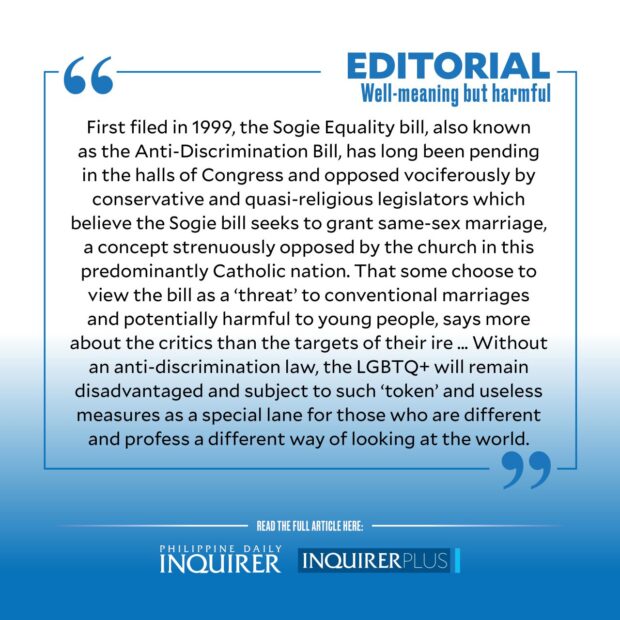Well-meaning but harmful

Perhaps contrary to the intent and expectation of officials, the announcement has been met with a tsunami of critical reactions. Reyna Valmores, national chair of the advocacy group Bahaghari (Rainbow) said the gesture may have been “well-meaning” but ultimately misguided. While they welcomed LTO’s initiative, said Valmores, priority lanes in government agencies are meant to serve people coping with physical difficulties. “So,” the advocate pointed out, “we want to make it clear—being an LGBTQ+ (lesbian, gay, bisexual, transsexual, queer and other sexualities) in no way impairs or affects a person in a physical capacity to take part in crucial government functions.” The accommodation for sexual minorities, Valmores added, could lead to a “misleading implication” that an alternative sexuality is an impairment.
“Enough with excessive pandering,” netizen Anna Cosio remarked in a post. “Not only are you insulting the group you are pandering to, you are also drawing unnecessary animosity toward them.” On the other hand, the LTO spokesperson explained that the lanes are “just to make sense and elevate the confidence of that sector which has been, until now, discriminated and ostracized, thus we are fostering the understanding and acceptance of the members of the LGBTQ as equal.” She added that the inclusion of the LGBTQ+ in the LTO’s priority lanes was part of the agency’s “gender and development” project. Another LTO officer, apologizing for offending the sensibilities of the targeted group, said there was no malice behind the policy “but only good intentions.”
Article continues after this advertisementNo malice perhaps, but what exactly did LTO officials hope to achieve? In the first place, how are officials in LTO offices supposed to discern who among the public are members of the LGBTQ+ community? Sexual orientation may be expressed in many ways including how one dresses, behaves, or holds oneself, but oftentimes it is also a private inclination that many may not want to broadcast to the public. Are clerks or guards expected to interview those in these special lanes as to their sexual orientation?
Indeed, the new policy could even work against the LGBTQ+. Bahaghari, in a statement, said it could even be potentially harmful to the community since, given the prejudice that they already face, “to this day, many people including lawmakers cite the erroneous idea that being LGBTQ+ is a disorder.” The group has offered to hold gender sensitivity training for personnel of LTO and other government offices to assist them in forming truly anti-discriminatory policies.
One reason the LGBTQ+ community has fought so hard for recognition is their aspiration for equality, to enjoy the same civil and political rights, privileges, recognition, opportunities, and economic rewards enjoyed by other citizens. Then, too our present laws need to be amended to ensure that no one—the young, the old, the disabled, and those of a different sexual orientation—is disadvantaged through no fault of his or her own.
Article continues after this advertisementWhich brings us to a piece of legislation that is, unlike the LTO’s “well-meaning” policy, would significantly prevent discrimination on the basis of gender in the workplace, in schools, and in civic spaces, and provide other protections including economic support. The Sogie bill, for “sexual orientation and gender identity and expression,’’ has been stuck in the labyrinthine procedures of the legislature for over two decades. Aiming to protect people who are continually harmed by institutionalized discrimination, it seeks to ensure that LGBTQ+ individuals are protected from abuse, dehumanization, and violence in society.
First filed in 1999, the Sogie Equality bill, also known as the Anti-Discrimination bill, has long been pending in the halls of Congress and opposed vociferously by conservative and quasireligious legislators which believe the Sogie bill seeks to grant same-sex marriage, a concept strenuously opposed by the church in this predominantly Catholic nation.
That some choose to view the bill as a “threat” to conventional marriages and potentially harmful to young people, says more about the critics than the targets of their ire. But given this strong obstacle, the proponents of the Sogie bill must prove that the measure is not an insidious move to promote same-sex marriage but a tinely legislation to provide recognition and protection to sexual minorities. Because without an anti-discrimination law, the LGBTQ+ will remain disadvantaged and subject to such “token” and useless measures as a special lane for those who are different and profess a different way of looking at the world.
















